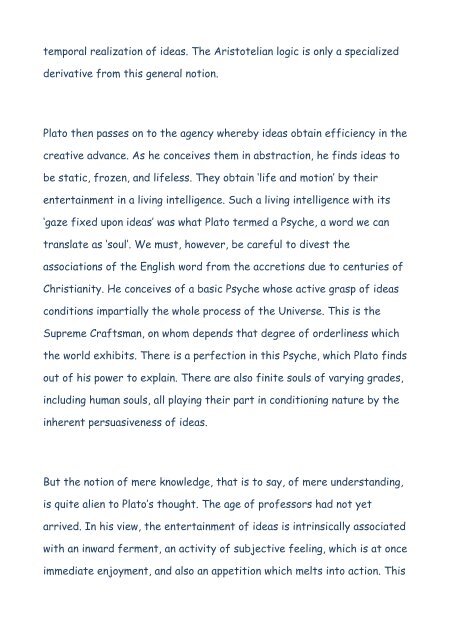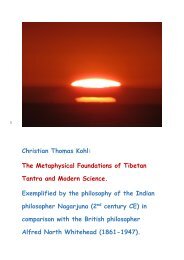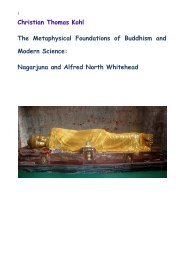Christian Thomas Kohl The Metaphysical Foundations of Buddhism and Modern Science
Christian Thomas Kohl The Metaphysical Foundations of Buddhism and Modern Science
Christian Thomas Kohl The Metaphysical Foundations of Buddhism and Modern Science
You also want an ePaper? Increase the reach of your titles
YUMPU automatically turns print PDFs into web optimized ePapers that Google loves.
temporal realization <strong>of</strong> ideas. <strong>The</strong> Aristotelian logic is only a specialized<br />
derivative from this general notion.<br />
Plato then passes on to the agency whereby ideas obtain efficiency in the<br />
creative advance. As he conceives them in abstraction, he finds ideas to<br />
be static, frozen, <strong>and</strong> lifeless. <strong>The</strong>y obtain ‘life <strong>and</strong> motion’ by their<br />
entertainment in a living intelligence. Such a living intelligence with its<br />
‘gaze fixed upon ideas’ was what Plato termed a Psyche, a word we can<br />
translate as ‘soul’. We must, however, be careful to divest the<br />
associations <strong>of</strong> the English word from the accretions due to centuries <strong>of</strong><br />
<strong>Christian</strong>ity. He conceives <strong>of</strong> a basic Psyche whose active grasp <strong>of</strong> ideas<br />
conditions impartially the whole process <strong>of</strong> the Universe. This is the<br />
Supreme Craftsman, on whom depends that degree <strong>of</strong> orderliness which<br />
the world exhibits. <strong>The</strong>re is a perfection in this Psyche, which Plato finds<br />
out <strong>of</strong> his power to explain. <strong>The</strong>re are also finite souls <strong>of</strong> varying grades,<br />
including human souls, all playing their part in conditioning nature by the<br />
inherent persuasiveness <strong>of</strong> ideas.<br />
But the notion <strong>of</strong> mere knowledge, that is to say, <strong>of</strong> mere underst<strong>and</strong>ing,<br />
is quite alien to Plato’s thought. <strong>The</strong> age <strong>of</strong> pr<strong>of</strong>essors had not yet<br />
arrived. In his view, the entertainment <strong>of</strong> ideas is intrinsically associated<br />
with an inward ferment, an activity <strong>of</strong> subjective feeling, which is at once<br />
immediate enjoyment, <strong>and</strong> also an appetition which melts into action. This


















